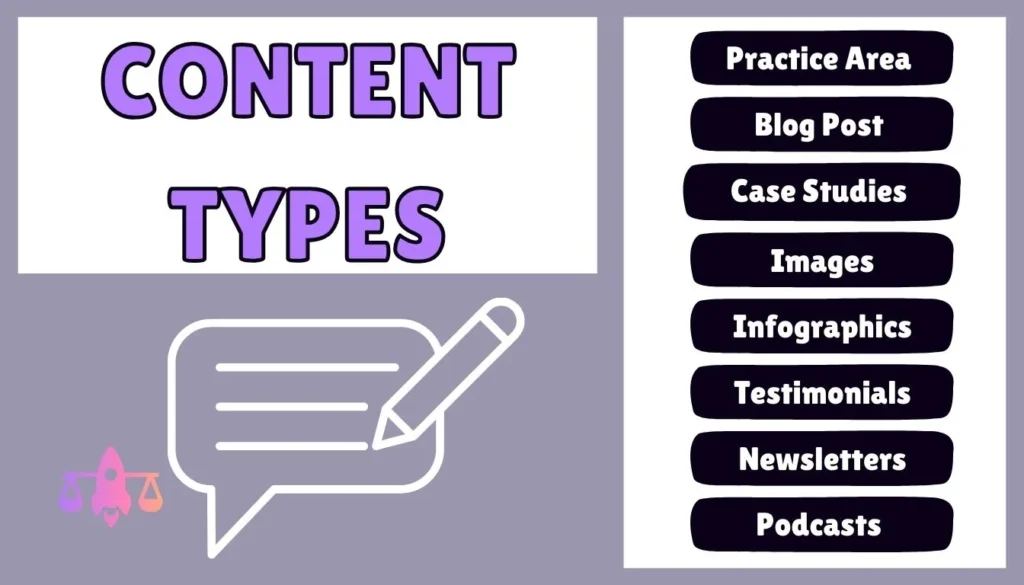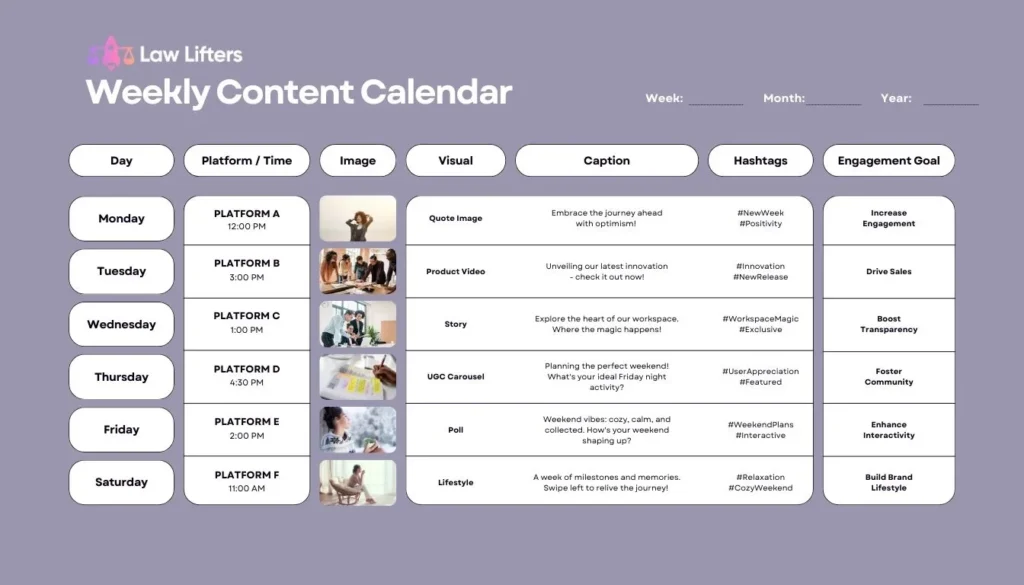In today’s digital world, standing out as a lawyer requires more than just expertise in the courtroom. It demands a strategic digital marketing approach to connect with potential clients and build your brand.
Enter content marketing for lawyers—a powerful tool that allows you to share your knowledge while establishing trust and authority in your niche.
This guide will walk you through the essentials of legal content marketing, helping you create compelling materials that resonate with your audience.
Ready to transform how you engage with clients? Let’s dive into the world of content creation tailored specifically for legal professionals!
What Is Lawyers Content Marketing?
Lawyers’ content marketing is the practice of producing and sharing valuable information to attract potential clients. It involves creating various types of content, such as articles, videos, and social media posts that address legal topics relevant to your audience.
The goal is not only to showcase expertise but also to build trust and foster relationships with prospective clients. By providing helpful resources, you position yourself as a knowledgeable authority in your field while enhancing brand visibility online.
What does Content Optimization Mean?
Content optimization refers to the process of improving your content so it ranks higher in search engines and appeals more to readers. It involves using relevant keywords, ensuring readability, and structuring your information effectively.
Additionally, optimized content addresses user intent by providing valuable answers or insights. This means creating informative pieces that not only attract traffic but also engage visitors, encouraging them to take action—like reaching out for legal services or sharing your expertise with others.
Why Is Legal Content Marketing Important for Lawyers?
Legal content marketing is important for lawyers to establish authority in their field. It helps build trust with potential clients, showcasing expertise and knowledge. By sharing valuable insights, attorneys can position themselves as thought leaders.
Effective content marketing enhances online visibility. Well-optimized articles and resources improve search engine rankings, making it easier for clients to find legal services. This connection ultimately leads to increased client engagement and a more robust practice overall.
Set Your Practice Up for Success with Content Creation Tailored to Your Niche
Identifying your niche is important for effective content marketing. Customizing your content to specific areas of law allows you to attract clients who are actively seeking expertise in those fields. This focused approach builds trust and establishes authority, making potential clients more likely to reach out.
Create relevant content and resources that address common questions or concerns within your niche. Whether it’s articles, videos, or infographics, downloadable guides, providing valuable insights not only engages your audience but also positions you as a go-to expert in your practice area.
What Types of Content Lawyers Should Create?

Lawyers can diversify their content to attract various audiences. Practice area pages provide crucial information about services, while blog posts can address common legal questions and trends in the law. Case studies illustrate successful outcomes, enhancing credibility.
These content types are great inbound marketing ideas for lawyers, helping to pull in clients organically through valuable, informative material.
- Practice Area Pages
- Blog Posts and Articles
- Case Studies
- Images
- Infographics
- Explainer and commercial videos
- Testimonials
- Email Newsletters
- Podcasts, Webinars and Live Streams
Practice Area Pages
Practice area pages or service pages are essential for showcasing your legal expertise. These dedicated sections on web content help potential clients understand the specific services you offer and provide valuable information about each practice area.
Blog Posts and Articles
Online blog posts are an essential tool for lawyers looking to connect with their audience. They allow you to share insights, legal updates, and personal experiences that resonate with potential clients. Regularly publishing informative content helps establish your authority in the field.
Case Studies
Case studies are powerful storytelling tools for lawyers. They showcase real-life scenarios where your legal expertise made a difference. This type of content helps potential clients relate to your practice and understand the outcomes you can achieve.
Images
Images play a crucial role in content marketing for lawyers. They capture attention and can simplify complex legal concepts, making them more relatable to potential clients. High-quality visuals enhance the overall appeal of your website or blog.
Infographics
Infographics are powerful tools for lawyers. They present complex legal information in a visually engaging way. By using graphics, charts, and concise text, you can simplify intricate topics. This makes it easier for potential clients to understand your services.
Explainer and Commercial Videos
Explainer and commercial videos are powerful tools for lawyers to communicate complex legal concepts in an engaging way. These visuals can simplify your services, helping potential clients understand what you offer quickly.
Testimonials
Testimonials are powerful tools in legal content marketing. They build trust and credibility for your law firm by showcasing real experiences from satisfied clients. Potential clients often look for social proof before making a decision, and testimonials provide just that.
Email Newsletters
Email newsletters are a powerful tool for lawyers in legal industry to maintain contact with clients and prospects. They provide valuable updates on legal topics, practice areas, and firm news while fostering trust and engagement.
Podcasts, Webinars and Live Streams
Podcasts, webinars, and live streams are powerful tools for lawyers to connect with their audience. They allow you to share your expertise in a dynamic format while engaging potential clients directly.
These platforms foster trust and showcase your personality. You can address common legal questions or discuss recent case law, creating an informative experience that resonates. Plus, the on-demand nature of podcasts makes it easy for listeners to access content anytime, boosting your reach beyond traditional marketing methods.
How to Optimize Your Law Firm Content
Start by documenting your lawyer content marketing strategy. Outline your goals, target audience, and the types of content you plan to create. This structured approach helps maintain focus and ensures consistency across all platforms.
- Document your Content Strategy
- Create a Content Calendar
- Research and Understand your Audience
- Keyword Research
- Satisfy User Intent
- Make your Content Accessible and Engaging
- Use the Pillar Content Strategy
- Heading Structure
- Long Form Content
- Multimedia
- Geo and Local Targeting
- Content Refreshes
Document your Content Strategy
A well-documented effective content marketing strategy is essential for lawyers aiming to stand out. Start by outlining your goals, target audience, and the types of content you plan to produce. This clarity helps maintain focus and direction in your efforts.
Regularly review and update your strategy as needed. Adaptability is key in a dynamic field like law. By keeping thorough documentation, you’ll ensure that every piece of content aligns with your overall objectives and resonates with potential clients effectively.
Create a Content Calendar

A content calendar is essential for organizing your legal content strategy. It helps you plan, schedule, and track topics that resonate with your audience. By mapping out what to publish and when, you ensure consistency in your messaging.
This tool also allows you to align content with important dates or events relevant to your practice area. Regularly updating the calendar keeps your ideas fresh and supports strategic goals while helping team members stay on the same page throughout each project.
Research and Understand Audience
Understanding your audience is key to effective content marketing for lawyers. Start by identifying who your potential clients are, their legal needs, and the challenges they face. Use surveys, social media insights, and client feedback to gather valuable data.
Once you have this information, create detailed buyer personas. These profiles will guide your quality content creation process, helping you address specific pain points with tailored solutions that resonate deeply with your target audience’s interests and concerns.
Keyword Research
Keyword research is the foundation of content marketing for lawyers. They help search engines understand what your content is about and connect it with users’ queries. Targeting the right keywords can increase visibility and attract potential clients.
Research relevant legal terms and phrases that prospects might use when seeking services like yours. Incorporate these naturally into your content for SEO optimization. This will enhance its relevance while avoiding keyword stuffing, which can harm readability and SEO performance.
You can use different keyword research tools like Google Keyword Planner, Ahref, SEMrush etc.
Satisfy user Intent
Understanding user intent is important in content marketing for lawyers. Your audience seeks specific information when browsing online, whether it’s legal advice or answers to pressing questions. Tailoring your content to meet these needs can significantly enhance engagement.
Analyze the search queries that bring visitors to your site. Create valuable content that addresses common concerns and provides valuable insights. By satisfying user intent, you not only build trust but also increase the likelihood of converting visitors into clients.
Make your Content Accessible and Engaging
Creating accessible content starts with clarity. Use simple language and avoid jargon to ensure your message reaches a wider audience. Consider adding alt text for images and ensuring your law firm website is navigable for users with disabilities.
Engagement comes from appealing visuals, compelling stories, and interactive elements. Incorporate questions that invite readers to think or respond. Use bullet points or numbered lists to break up information, making it easier to digest while keeping their attention focused on your key messages.
Use the Pillar Content Strategy
The pillar content strategy is a powerful way to organize your law firm’s content. By creating comprehensive, in-depth pieces on core topics relevant to your practice, you establish authority and expertise. Each pillar can link to smaller, related articles that dive deeper into specific aspects.
This interconnected structure not only enhances user experience but also boosts lawyer SEO performance. Search engines love well-organized content clusters. With clear pathways for readers, you keep them engaged and encourage longer visits on your site.
Heading Structure
A clear heading structure enhances the readability of your content. It helps guide readers through your articles, making it easier to find relevant information quickly. Use H1 for titles and follow with H2s and H3s for subsections. This hierarchy keeps everything organized.
Search engines also appreciate a well-structured heading format. It aids in indexing your content effectively, improving SEO performance. Incorporating keywords into headings can further optimize visibility while ensuring user engagement remains high throughout the article.
Long Form Content
Long form content allows lawyers to delve deeply into complex legal topics. It provides a platform for thorough explanations, showcasing expertise and authority in the field.
This format often includes detailed guides, comprehensive articles, or extensive case analyses. By addressing multiple facets of an issue, long form content can better satisfy user intent while improving search rankings. Engaging narratives and well-researched information keep readers interested and encourage them to share your insights with others.
Multimedia
Multimedia enhances your content marketing for lawyers by engaging clients in diverse ways. Incorporating images, videos, and audio can make complex legal topics more accessible and easier to understand.
Visual elements like infographics simplify data while video explanations provide a personal touch. Podcasts allow you to share insights on-the-go, reaching a wider audience without being confined to text-based formats. This variety keeps your audience interested and encourages them to return for more valuable information.
Geo and Local Targeting
Incorporating geo-targeting into your content marketing for lawyers can significantly enhance visibility. By tailoring your content to specific locations, you connect with potential clients searching for legal services in their area.
Focus on local keywords and phrases relevant to your practice. This not only helps improve search rankings but also builds trust within the community. Localized content creates a sense of familiarity and relevance, making it more likely that prospective clients will reach out when they need legal assistance.
Showcase E-E-A-T
E-E-A-T stands for Experience, Expertise, Authoritativeness, and Trustworthiness. For lawyers, showcasing E-E-A-T is essential in content marketing. It helps build credibility with potential clients who are searching for legal guidance.
Highlight your qualifications and experience in specific areas of law. Use client testimonials and case studies to demonstrate successful outcomes. By establishing a strong E-E-A-T framework, you position yourself as a reliable resource in the legal field that clients can trust when seeking assistance.
Content Refreshes
Content refreshes are essential for keeping your legal resources relevant. Updating existing blog posts, practice area pages, and other materials ensures they reflect current laws and trends. This not only boosts SEO but also enhances the user experience.
Regularly revisiting your content can help it rank better on search engines. Adding new statistics or case studies makes your material more credible and engaging. Freshness signals to both search engines and potential clients that you’re active in your field.
Monitor Content Performance
Monitoring content performance is crucial for any law firm. It allows you to see what resonates with your audience and what falls flat. Utilize analytics tools to track metrics like page views, bounce rates, and engagement levels.
Regularly review this data to inform your future strategies. Adjust your approach based on which topics or formats drive the most traffic. Continuous evaluation helps ensure that your content marketing efforts yield the best SEO results while staying aligned with client needs.
6 Quick Tips on Content Creation and Optimization for Lawyers
Content marketing for lawyers can greatly enhance your online presence and client engagement. Here are six quick tips to boost your legal profession content creation and optimization efforts:
- Focus on quality over quantity—excellent content will always outperform a high volume of mediocre posts.
- Utilize relevant keywords strategically; they help search engines find you without compromising readability.
- Keep track of industry trends to ensure your content remains timely and valuable to your audience.
- Incorporate multimedia elements like videos and infographics for varied engagement methods.
- Promote user interaction through comments or social media shares, fostering community around your brand.
- Regularly review analytics data to adapt strategies based on what resonates with potential clients.
Implement these strategies, and watch your law firm thrive in the digital landscape!
Key Takeaways from this Guide
- Content marketing helps lawyers build trust, showcase expertise, and improve online visibility.
- Create varied content like practice area pages, blog posts, case studies, videos, and infographics to engage different audiences.
- Optimize content for SEO using relevant keywords, geo-targeting, and addressing user intent.
- Tailor content to your legal niche to build authority and attract clients looking for specific expertise.
- Develop a structured content strategy with a content calendar and refresh content regularly for relevance.
- Showcase Experience, Expertise, Authoritativeness, and Trustworthiness (E-E-A-T) through testimonials, case studies, and qualifications.
- Monitor content performance using analytics and adjust strategies based on what resonates with your audience.



